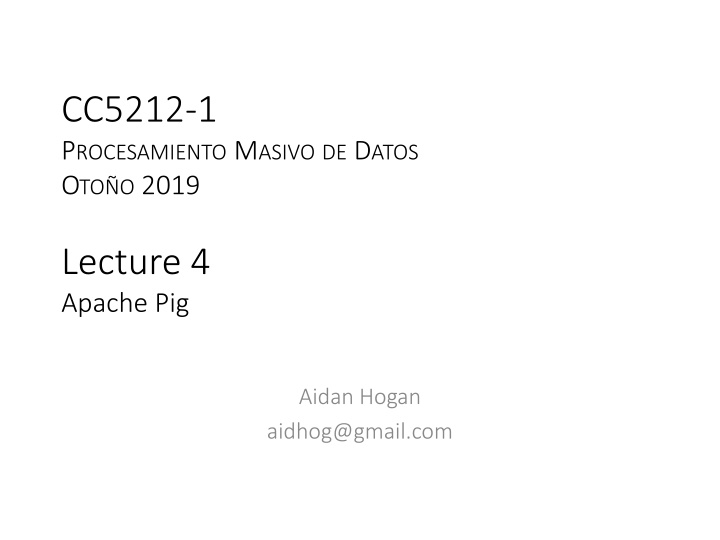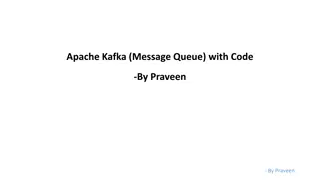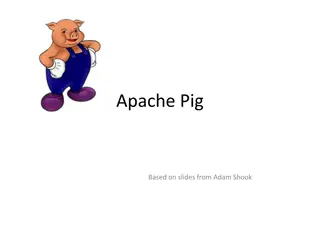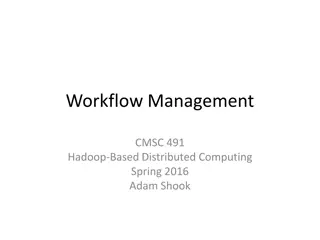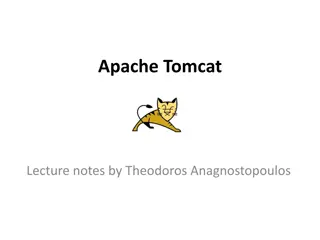Processing Big Data with Apache Pig in Hadoop Ecosystem
Explore how Apache Pig can be utilized in the Hadoop ecosystem to process large-scale data efficiently. Learn about concepts such as handling multiple inputs, job chaining, setting reducers, and utilizing a distributed cache. Compare Hadoop with SQL and understand why SQL might not be suitable for large data workloads. Dive into Hadoop internals for a deeper understanding.
Download Presentation

Please find below an Image/Link to download the presentation.
The content on the website is provided AS IS for your information and personal use only. It may not be sold, licensed, or shared on other websites without obtaining consent from the author.If you encounter any issues during the download, it is possible that the publisher has removed the file from their server.
You are allowed to download the files provided on this website for personal or commercial use, subject to the condition that they are used lawfully. All files are the property of their respective owners.
The content on the website is provided AS IS for your information and personal use only. It may not be sold, licensed, or shared on other websites without obtaining consent from the author.
E N D
Presentation Transcript
CC5212-1 PROCESAMIENTO MASIVO DE DATOS OTO O 2019 Lecture 4 Apache Pig Aidan Hogan aidhog@gmail.com
Hadoop: Supermarket Example Compute total sales per hour of the day?
More in Hadoop: Multiple Inputs Multiple inputs, different map for each One reducer
More in Hadoop: Chaining Jobs Run and wait Output of Job1 set to Input of Job2
More in Hadoop: Number of Reducers Set number of parallel reducer tasks for the job Why would we ask for 1 reduce task? Output requires a merge on one machine (for example, sorting, top-k)
Hadoop: Filtered Supermarket Example Compute total sales per hour of the day but exclude certain item IDs passed as an input file?
More in Hadoop: Distributed Cache Some tasks need global knowledge Hopefully not too much though Use a distributed cache: Makes global data available locally to all nodes On the local hard-disk of each machine How might we use this? Make the filtered products global and read them (into memory?) when processing items
Apache Hadoop Internals (if interested) http://ercoppa.github.io/HadoopInternals/
SQL So why not just use SQL? Relational database engines not typically built for large workloads over bulk data; they optimise for answering queries that touch a small fraction of the data. At some stage, they will not scale further. But this is a reason not to use a relational database. The question was: why not just use SQL?
Apache Pig Create MapReduce programs to run on Hadoop run on Hadoop Use a high-level scripting language called Pig Latin Pig Latin Can embed User Defined Functions Functions: call a Java function (or Python, Ruby, etc.) User Defined Based on Pig Relations Pig Relations
Apache Pig Create MapReduce programs to run on Hadoop run on Hadoop Use a high-level scripting language called Pig Latin Atwhay anguagelay isyay isthay ? Pig Latin Can embed User Defined Functions Functions: call a Java function (or Python, Ruby, etc.) User Defined Based on Pig Relations Pig Relations
Pig Latin: Hello Word Count input_lines = LOAD '/tmp/book.txt' AS (line:chararray); -- Extract words from each line and put them into a pig bag -- datatype, then flatten the bag to get one word on each row words = FOREACH input_lines GENERATE FLATTEN(TOKENIZE(line)) AS word; Map Map -- filter out any words that are just white spaces filtered_words = FILTER words BY word MATCHES '\\w+'; -- create a group for each word word_groups = GROUP filtered_words BY word; Reduce Reduce -- count the entries in each group word_count = FOREACH word_groups GENERATE COUNT(filtered_words) AS count, group AS word; -- order the records by count ordered_word_count = ORDER word_count BY count DESC; Map Map + + Reduce Reduce STORE ordered_word_count INTO '/tmp/book-word-count.txt'; Any ideas which lines correspond to map and which to reduce?
Pig: Products by Hour transact.txt transact.txt customer412 customer412 customer412 customer413 customer413 customer413 customer413 customer413 customer414 customer414 customer414 customer415 customer415 1L_Leche Nescafe Nescafe 400g_Zanahoria El_Mercurio Gillette_Mach3 Santo_Domingo Nescafe Rosas Chocolates 300g_Frutillas Nescafe 12 Huevos 2014-03-31T08:47:57Z 2014-03-31T08:47:57Z 2014-03-31T08:47:57Z 2014-03-31T08:48:03Z 2014-03-31T08:48:03Z 2014-03-31T08:48:03Z 2014-03-31T08:48:03Z 2014-03-31T08:48:03Z 2014-03-31T08:48:24Z 2014-03-31T08:48:24Z 2014-03-31T08:48:24Z 2014-03-31T08:48:35Z 2014-03-31T08:48:35Z $900 $2.000 $2.000 $1.240 $500 $8.250 $2.450 $2.000 $7.000 $9.230 $1.230 $2.000 $2.200 Find the number of items sold per hour of the day
Pig: Products by Hour grunt> REGISTER REGISTER userDefinedFunctions.jar; User-defined-functions written in Java (or Python, Ruby, etc. ) userDefinedFunctions.jar userDefinedFunctions.jar
Pig: Products by Hour grunt> REGISTER grunt> raw = LOAD REGISTER userDefinedFunctions.jar; LOAD transact.txt' USING USING PigStorage('\t') AS AS (cust, item, time, price); View data as a (streaming) relation with fields (cust, item, etc.) and tuples (data rows) cust cust item item time time price price customer412 1L_Leche 2014-03-31T08:47:57Z $900 customer412 Nescafe 2014-03-31T08:47:57Z $2.000 customer412 Nescafe 2014-03-31T08:47:57Z $2.000 customer413 400g_Zanahoria 2014-03-31T08:48:03Z $1.240 raw: raw:
Pig: Products by Hour grunt> REGISTER grunt> raw = LOAD grunt>premium = FILTER REGISTER userDefinedFunctions.jar; LOAD transact.txt' USING FILTER raw BY USING PigStorage('\t') AS BY org.udf.MinPrice1000(price); AS (cust, item, time, price); Filter tuples depending on their value for a given attribute (in this case, price < 1000) cust cust item item time time price price customer412 1L_Leche 2014-03-31T08:47:57Z $900 customer412 Nescafe 2014-03-31T08:47:57Z $2.000 customer412 Nescafe 2014-03-31T08:47:57Z $2.000 customer413 400g_Zanahoria 2014-03-31T08:48:03Z $1.240 raw: raw:
Pig: Products by Hour grunt> REGISTER grunt> raw = LOAD grunt>premium = FILTER REGISTER userDefinedFunctions.jar; LOAD transact.txt' USING FILTER raw BY USING PigStorage('\t') AS BY org.udf.MinPrice1000(price); AS (cust, item, time, price); Filter tuples depending on their value for a given attribute (in this case, price < 1000) cust cust item item time time price price customer412 Nescafe 2014-03-31T08:47:57Z $2.000 customer412 Nescafe 2014-03-31T08:47:57Z $2.000 customer413 400g_Zanahoria 2014-03-31T08:48:03Z $1.240 customer413 Gillette_Mach3 2014-03-31T08:48:03Z $8.250 premium: premium:
Pig: Products by Hour grunt> REGISTER grunt> raw = LOAD grunt>premium = FILTER grunt>hourly = FOREACH REGISTER userDefinedFunctions.jar; LOAD transact.txt' USING FILTER raw BY FOREACH premium GENERATE USING PigStorage('\t') AS BY org.udf.MinPrice1000(price); GENERATE cust, item, org.udf.ExtractHour(time) AS AS (cust, item, time, price); AS hour, price; cust cust item item time time price price customer412 Nescafe 2014-03-31T08:47:57Z $2.000 customer412 Nescafe 2014-03-31T08:47:57Z $2.000 customer413 400g_Zanahoria 2014-03-31T08:48:03Z $1.240 customer413 Gillette_Mach3 2014-03-31T08:48:03Z $8.250 premium: premium:
Pig: Products by Hour grunt> REGISTER grunt> raw = LOAD grunt>premium = FILTER grunt>hourly = FOREACH REGISTER userDefinedFunctions.jar; LOAD transact.txt' USING FILTER raw BY FOREACH premium GENERATE USING PigStorage('\t') AS BY org.udf.MinPrice1000(price); GENERATE cust, item, org.udf.ExtractHour(time) AS AS (cust, item, time, price); AS hour, price; cust cust item item hour hour price price customer412 Nescafe 08 $2.000 customer412 Nescafe 08 $2.000 customer413 400g_Zanahoria 08 $1.240 customer413 Gillette_Mach3 08 $8.250 hourly: hourly:
Pig: Products by Hour grunt> REGISTER grunt> raw = LOAD grunt>premium = FILTER grunt>hourly = FOREACH grunt>unique = DISTINCT REGISTER userDefinedFunctions.jar; LOAD transact.txt' USING FILTER raw BY FOREACH premium GENERATE DISTINCT hourly; USING PigStorage('\t') AS BY org.udf.MinPrice1000(price); GENERATE cust, item, org.udf.ExtractHour(time) AS AS (cust, item, time, price); AS hour, price; cust cust item item hour hour price price customer412 Nescafe 08 $2.000 customer412 Nescafe 08 $2.000 customer413 400g_Zanahoria 08 $1.240 customer413 Gillette_Mach3 08 $8.250 hourly: hourly:
Pig: Products by Hour grunt> REGISTER grunt> raw = LOAD grunt>premium = FILTER grunt>hourly = FOREACH grunt>unique = DISTINCT grunt>hrItem = GROUP REGISTER userDefinedFunctions.jar; LOAD transact.txt' USING FILTER raw BY FOREACH premium GENERATE DISTINCT hourly; GROUP unique BY USING PigStorage('\t') AS BY org.udf.MinPrice1000(price); GENERATE cust, item, org.udf.ExtractHour(time) AS AS (cust, item, time, price); AS hour, price; BY (item, hour); cust cust item item hour hour price price customer412 Nescafe 08 $2.000 customer413 400g_Zanahoria 08 $1.240 customer413 Gillette_Mach3 08 $8.250 customer413 Santo_Domingo 08 $2.450 unique: unique:
Pig: Products by Hour grunt> REGISTER grunt> raw = LOAD grunt>premium = FILTER grunt>hourly = FOREACH grunt>unique = DISTINCT grunt>hrItem = GROUP REGISTER userDefinedFunctions.jar; LOAD transact.txt' USING FILTER raw BY FOREACH premium GENERATE DISTINCT hourly; GROUP unique BY USING PigStorage('\t') AS BY org.udf.MinPrice1000(price); GENERATE cust, item, org.udf.ExtractHour(time) AS AS (cust, item, time, price); AS hour, price; BY (item, hour); [ [item,hour item,hour] ] cust cust item item hour hour price price customer412 Nescafe 08 $2.000 [Nescafe,08] customer413 Nescafe 08 $2.000 customer415 Nescafe 08 $2.000 [400g_Zanahoria,08] customer413 400g_Zanahoria 08 $1.240 hrItem hrItem: :
Pig: Products by Hour grunt> REGISTER grunt> raw = LOAD grunt>premium = FILTER grunt>hourly = FOREACH grunt>unique = DISTINCT grunt>hrItem = GROUP grunt>hrItemCnt = FOREACH REGISTER userDefinedFunctions.jar; LOAD transact.txt' USING FILTER raw BY FOREACH premium GENERATE DISTINCT hourly; GROUP unique BY FOREACH hrItem GENERATE USING PigStorage('\t') AS BY org.udf.MinPrice1000(price); GENERATE cust, item, org.udf.ExtractHour(time) AS AS (cust, item, time, price); AS hour, price; BY (item, hour); GENERATE flatten($0), COUNT COUNT($1) AS AS count; [ [item,hour item,hour] ] cust cust item item hour hour price price customer412 Nescafe 08 $2.000 [Nescafe,08] customer413 Nescafe 08 $2.000 count customer415 Nescafe 08 $2.000 [400g_Zanahoria,08] customer413 400g_Zanahoria 08 $1.240 hrItem hrItem: :
Pig: Products by Hour grunt> REGISTER grunt> raw = LOAD grunt>premium = FILTER grunt>hourly = FOREACH grunt>unique = DISTINCT grunt>hrItem = GROUP grunt>hrItemCnt = FOREACH REGISTER userDefinedFunctions.jar; LOAD transact.txt' USING FILTER raw BY FOREACH premium GENERATE DISTINCT hourly; GROUP unique BY FOREACH hrItem GENERATE USING PigStorage('\t') AS BY org.udf.MinPrice1000(price); GENERATE cust, item, org.udf.ExtractHour(time) AS AS (cust, item, time, price); AS hour, price; BY (item, hour); GENERATE flatten($0), COUNT COUNT($1) AS AS count; [ [item,hour item,hour] ] count count [400g_Zanahoria,08] 1 [Nescafe,08] 3 hrItemCnt hrItemCnt: :
Pig: Products by Hour grunt> REGISTER grunt> raw = LOAD grunt>premium = FILTER grunt>hourly = FOREACH grunt>unique = DISTINCT grunt>hrItem = GROUP grunt>hrItemCnt = FOREACH grunt>hrItemCntSorted = ORDER REGISTER userDefinedFunctions.jar; LOAD transact.txt' USING FILTER raw BY FOREACH premium GENERATE DISTINCT hourly; GROUP unique BY FOREACH hrItem GENERATE ORDER hrItemCnt BY USING PigStorage('\t') AS BY org.udf.MinPrice1000(price); GENERATE cust, item, org.udf.ExtractHour(time) AS AS (cust, item, time, price); AS hour, price; BY (item, hour); GENERATE flatten($0), COUNT BY count DESC COUNT($1) AS AS count; DESC; [ [item,hour item,hour] ] count count [400g_Zanahoria,08] 1 [Nescafe,08] 3 hrItemCnt hrItemCnt: :
Pig: Products by Hour grunt> REGISTER grunt> raw = LOAD grunt>premium = FILTER grunt>hourly = FOREACH grunt>unique = DISTINCT grunt>hrItem = GROUP grunt>hrItemCnt = FOREACH grunt>hrItemCntSorted = ORDER REGISTER userDefinedFunctions.jar; LOAD transact.txt' USING FILTER raw BY FOREACH premium GENERATE DISTINCT hourly; GROUP unique BY FOREACH hrItem GENERATE ORDER hrItemCnt BY USING PigStorage('\t') AS BY org.udf.MinPrice1000(price); GENERATE cust, item, org.udf.ExtractHour(time) AS AS (cust, item, time, price); AS hour, price; BY (item, hour); GENERATE flatten($0), COUNT BY count DESC COUNT($1) AS AS count; DESC; [ [item,hour item,hour] ] count count [Nescafe,08] 3 [400g_Zanahoria,08] 1 hrItemCntSorted hrItemCntSorted: :
Pig: Products by Hour grunt> REGISTER grunt> raw = LOAD grunt>premium = FILTER grunt>hourly = FOREACH grunt>unique = DISTINCT grunt>hrItem = GROUP grunt>hrItemCnt = FOREACH grunt>hrItemCntSorted = ORDER grunt>STORE STORE hrItemCntSorted INTO REGISTER userDefinedFunctions.jar; LOAD transact.txt' USING FILTER raw BY FOREACH premium GENERATE DISTINCT hourly; GROUP unique BY FOREACH hrItem GENERATE ORDER hrItemCnt BY USING PigStorage('\t') AS BY org.udf.MinPrice1000(price); GENERATE cust, item, org.udf.ExtractHour(time) AS AS (cust, item, time, price); AS hour, price; BY (item, hour); GENERATE flatten($0), COUNT BY count DESC INTO output.txt ; COUNT($1) AS AS count; DESC; [ [item,hour item,hour] ] count count [Nescafe,08] 3 [400g_Zanahoria,08] 1 hrItemCntSorted hrItemCntSorted: :
Pig Relations Pig Relations: Like relational tables Except tuples can be jagged Fields in the same column don t need to be same type Relations are by default unordered Pig Schema: Names for fields, etc. AS AS (cust, item, time, price); cust cust item item time time price price customer412 1L_Leche 2014-03-31T08:47:57Z $900 customer412 Nescafe 2014-03-31T08:47:57Z $2.000 customer412 Nescafe 2014-03-31T08:47:57Z $2.000 customer413 400g_Zanahoria 2014-03-31T08:48:03Z $1.240
Pig Fields Pig Fields: Reference using name premium = FILTER or position premium = FILTER More readable! FILTER raw BY BY org.udf.MinPrice1000(price); FILTER raw BY BY org.udf.MinPrice1000($3); Starts at zero. cust cust item item time time price price customer412 1L_Leche 2014-03-31T08:47:57Z $900 customer412 Nescafe 2014-03-31T08:47:57Z $2.000 customer412 Nescafe 2014-03-31T08:47:57Z $2.000 customer413 400g_Zanahoria 2014-03-31T08:48:03Z $1.240
Pig Simple Types Pig Types: LOAD LOAD transact.txt' USING (cust:charArray, item:charArray, time:datetime, price:int); USING PigStorage('\t') AS AS int, long, float, double, biginteger, bigdecimal, boolean, chararray (string), bytearray (blob), datetime
Pig Types: Duck Typing What happens if you omit types? Fields default to bytearray Implicit conversions if needed (~duck typing) A = LOAD LOAD 'data' AS B = FOREACH FOREACHA GENERATE C = FOREACH FOREACHA GENERATE AS (cust, item, hour, price); GENERATEhour + 4 % 24; GENERATEhour + 4f % 24; hour an integer hour a float
Pig Complex Types: Tuple cat data; (3,8,9) (4,5,6) (1,4,7) (3,7,5) (2,5,8) (9,5,8) A = LOAD LOAD'data' AS AS (t1:tuple(t1a:int,t1b:int,t1c:int),t2:tuple(t2a:int,t2b:int,t2c:int)); DUMP DUMP A; ((3,8,9),(4,5,6)) ((1,4,7),(3,7,5)) ((2,5,8),(9,5,8)) X = FOREACH FOREACH A GENERATE GENERATEt1.t1a,t2.$0; t1 t1 t2 t2 t1a t1b t1c t2a t2b t2c 3 8 9 4 5 6 1 4 7 3 7 5 A: A: 2 5 8 9 5 8
Pig Complex Types: Tuple cat data; (3,8,9) (4,5,6) (1,4,7) (3,7,5) (2,5,8) (9,5,8) A = LOAD LOAD'data' AS AS (t1:tuple(t1a:int,t1b:int,t1c:int),t2:tuple(t2a:int,t2b:int,t2c:int)); DUMP DUMP A; ((3,8,9),(4,5,6)) ((1,4,7),(3,7,5)) ((2,5,8),(9,5,8)) X = FOREACH FOREACH A GENERATE DUMP DUMP X; (3,4) (1,3) (2,9) GENERATEt1.t1a,t2.$0; $0 $0 $1 $1 3 4 1 3 X: X: 2 9
Pig Complex Types: Bag cat data; (3,8,9) (2,3,6) (1,4,7) (2,5,8) A = LOAD LOAD'data' AS B = GROUP GROUP A BY AS (c1:int, c2:int, c3:int); BY c1; c1 c1 c2 c2 c3 c3 3 8 9 2 3 6 1 4 7 A: A: 2 5 8
Pig Complex Types: Bag cat data; (3,8,9) (2,3,6) (1,4,7) (2,5,8) A = LOAD LOAD'data' AS B = GROUP GROUP A BY DUMP DUMPB; (1,{(1,4,7)}) (2,{(2,5,8),(2,3,6)}) (3,{(3,8,9)}) AS (c1:int, c2:int, c3:int); BY c1; group group (c1) (c1) A A c1 c2 c3 3 3 8 9 2 3 6 2 2 5 8 B: B: 1 1 4 7
Pig Complex Types: Map cat prices; [Nescafe# $2.000 ] [Gillette_Mach3# $8.250 ] A = LOAD LOAD prices AS AS (M:map []);
Pig Complex Types: Summary tuple: A row in a table / a list of fields e.g., (customer412, Nescafe, 08, $2.000) bag: A set of tuples (allows duplicates) e.g., { (cust412, Nescafe, 08, $2.000), (cust413, Gillette_Mach3, 08, $8.250) } map: A set of key value pairs e.g., [Nescafe#$2.000]
APACHE PIG: UNNESTING (FLATTEN)
Pig Latin: Hello Word Count input_lines = LOAD '/tmp/book.txt' AS (line:chararray); -- Extract words from each line and put them into a pig bag -- datatype, then flatten the bag to get one word on each row words = FOREACH input_lines GENERATE FLATTEN(TOKENIZE(line)) AS word; -- filter out any words that are just white spaces filtered_words = FILTER words BY word MATCHES '\\w+'; -- create a group for each word word_groups = GROUP filtered_words BY word; -- count the entries in each group word_count = FOREACH word_groups GENERATE COUNT(filtered_words) AS count, group AS word; -- order the records by count ordered_word_count = ORDER word_count BY count DESC; STORE ordered_word_count INTO '/tmp/book-word-count.txt';
Pig Complex Types: Flatten Tuples cat data; (3,8,9) (4,5,6) (1,4,7) (3,7,5) (2,5,8) (9,5,8) A = LOAD LOAD'data' AS AS (t1:tuple(t1a:int,t1b:int,t1c:int),t2:tuple(t2a:int,t2b:int,t2c:int)); DUMP DUMP A; ((3,8,9),(4,5,6)) ((1,4,7),(3,7,5)) ((2,5,8),(9,5,8)) X = FOREACH FOREACH A GENERATE GENERATEflatten(t1), flatten(t2); t1 t1 t2 t2 t1a t1b t1c t2a t2b t2c 3 8 9 4 5 6 1 4 7 3 7 5 A: A: 2 5 8 9 5 8
Pig Complex Types: Flatten Tuples cat data; (3,8,9) (4,5,6) (1,4,7) (3,7,5) (2,5,8) (9,5,8) A = LOAD LOAD'data' AS AS (t1:tuple(t1a:int,t1b:int,t1c:int),t2:tuple(t2a:int,t2b:int,t2c:int)); DUMP DUMP A; ((3,8,9),(4,5,6)) ((1,4,7),(3,7,5)) ((2,5,8),(9,5,8)) X = FOREACH FOREACH A GENERATE DUMP DUMP X; (3,8,9,4,5,6) (1,4,7,3,7,5) (2,5,8,9,5,8) GENERATEflatten(t1), flatten(t2); t1a t1a t1b t1b t1c t1c t2a t2a t2b t2b t2c t2c 3 8 9 4 5 6 1 4 7 3 7 5 X: X: 2 5 8 9 5 8
Pig Complex Types: Flatten Tuples cat data; (3,8,9) (4,5,6) (1,4,7) (3,7,5) (2,5,8) (9,5,8) A = LOAD LOAD'data' AS AS (t1:tuple(t1a:int,t1b:int,t1c:int),t2:tuple(t2a:int,t2b:int,t2c:int)); DUMP DUMP A; ((3,8,9),(4,5,6)) ((1,4,7),(3,7,5)) ((2,5,8),(9,5,8)) Y = FOREACH FOREACH A GENERATE GENERATEt1, flatten(t2); t1 t1 t2 t2 t1a t1b t1c t2a t2b t2c 3 8 9 4 5 6 1 4 7 3 7 5 A: A: 2 5 8 9 5 8
Pig Complex Types: Flatten Tuples cat data; (3,8,9) (4,5,6) (1,4,7) (3,7,5) (2,5,8) (9,5,8) A = LOAD LOAD'data' AS AS (t1:tuple(t1a:int,t1b:int,t1c:int),t2:tuple(t2a:int,t2b:int,t2c:int)); DUMP DUMP A; ((3,8,9),(4,5,6)) ((1,4,7),(3,7,5)) ((2,5,8),(9,5,8)) Y = FOREACH FOREACH A GENERATE DUMP DUMP Y; ((3,8,9),4,5,6) ((1,4,7),3,7,5) ((2,5,8),9,5,8) GENERATEt1, flatten(t2); t1 t1 t2a t2a t2b t2b t2c t2c t1a t1b t1c 3 8 9 4 5 6 1 4 7 3 7 5 Y: Y: 2 5 8 9 5 8
